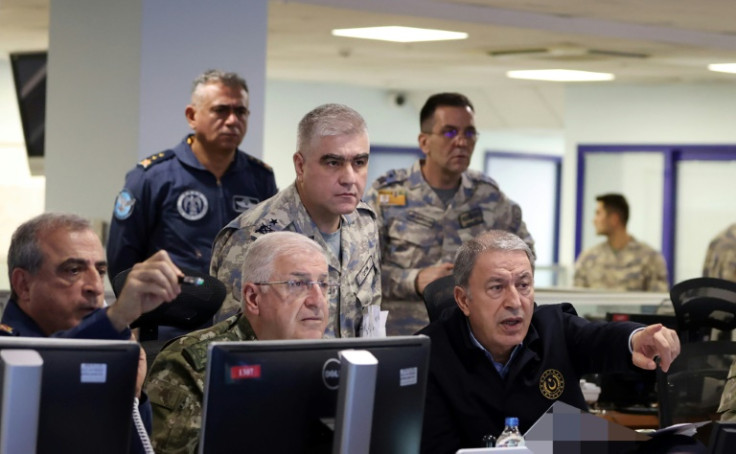Turkey Launches Air Raids Against Kurdish Militants In Syria, Iraq

Turkey announced early Sunday it had carried out air strikes against outlawed Kurdish militant bases across northern Syria and Iraq which it said were being used to launch "terrorist" attacks on its soil.
The offensive codenamed Operation Claw-Sword comes after a deadly blast in central Istanbul last Sunday which killed six people and wounded 81, with Turkey blaming a banned Kurdish group.
"We are starting Operation Claw-Sword from now on," Defence Minister Hulusi Akar said at the air force operations centre before the planes left their bases to hit the targets in northern Iraq and Syria.
Akar was also seen in a video image briefing President Recep Tayyip Erdogan who gave the order for the latest operation, which a monitor said had killed 12 people.
The raids targeted bases of the outlawed Kurdistan Workers' Party (PKK) and the Kurdish People's Protection Units (YPG), which Ankara considers an extension of the PKK, the defence ministry said.
"In line with our self-defence rights arising from Article 51 of the United Nations Charter, air operation Claw-Sword was carried out in the regions in the north of Iraq and Syria which are used as bases for attacks on our country by terrorists," it added.
Turkey blamed the PKK for the Istanbul bombing, the deadliest in five years and which evoked bitter memories of a wave of nationwide bombings from 2015 to 2017 that were attributed mostly to Kurdish militants and Islamic State group jihadists.
The PKK, which has waged a bloody insurgency in Turkey for decades and which is designated as a terror group by Turkey and its Western allies, and the YPG have both denied any involvement in the attack.
No individual or group has claimed responsibility.
Turkish police captured the chief suspect Alham Albashir -- a Syrian woman who is said to have been working for Kurdish militants -- in an Istanbul suburb.
"The hour of reckoning has come," the Turkish defence ministry tweeted, along with a photo of a plane taking off for a night operation.
"The treacherous attacks of the scoundrels are being held to account," it said.
"Terrorist hotbeds razed by precision strikes," the ministry said in another post, which was accompanied by a video showing a target being selected from the air followed by an explosion.
Turkey carried out more than 20 strikes on sites in the Syrian provinces of Raqa, Aleppo and Hassakeh, said the Syrian Observatory for Human Rights, a Britain-based monitoring group that has an extensive network of contacts across Syria.
The raids killed at least six members of the Kurdish-led Syrian Democratic Forces (SDF) and six pro-regime soldiers, the monitor said.
A PKK spokesman said the strikes have caused no casualties so far.
Turkey's army regularly hits the PKK's rear bases in Iraq -- a thorn in Ankara's relations with the government in Baghdad -- and since April it has carried out Operation Claw-Lock in northern Iraq in the pursuit of militants.
While Ankara did not give details of the operation, the US-backed SDF said the city of Kobane in northeast Syria was among the targets hit by Turkish raids.
"#Kobane, the city that defeated ISIS, is subjected to bombardment by the aircraft of the Turkish occupation," tweeted Farhad Shami, a spokesman for the SDF.
The SDF provided crucial assistance to a US-led coalition against jihadists of the Islamic State (IS) group.
But Turkey considers the YPG as a terror group linked to the PKK.
Turkish Interior Minister Suleyman Soylu has said Ankara believes the order for the Istanbul attack was given from Kobane, controlled by Syrian Kurdish militia forces.
"Turkish bombing of our safe areas threatens the whole region," Mazloum Abdi, the chief commander of the US-allied SDF, tweeted.
"This bombing is not in favour of any party. We are making every effort to avoid a major catastrophe. If war erupts, all will be affected."
Kobane, a Kurdish-majority town near the Turkish border, was captured by IS in late 2014 before Syrian Kurdish forces drove them out early the following year.
The US State Department had said on Friday it feared possible military action by Turkey, advising its nationals not to travel to northern Syria and Iraq.
Turkey has launched waves of attacks on Syria since 2016 targeting Kurdish militias as well as IS jihadists, and Ankara and forces backed by it have seized territory along the Syrian border.
Since May, Erdogan has threatened to launch a new operation in northern Syria.
© Copyright AFP 2024. All rights reserved.



















